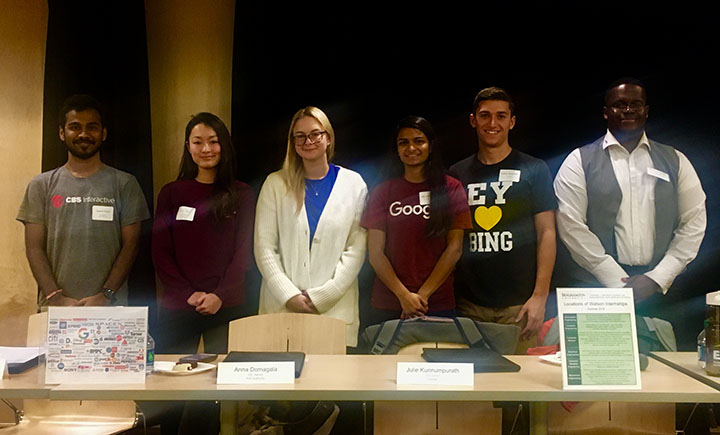Six internship tips from Watson School students who have been there
A group of students from the Watson School shared their internship experiences with students curious about the process and obstacles.

Internships are an invaluable resource for students from undergrad to PhD, but for engineering students, those technical interviews and case study questions can be intimidating.
That’s why a group of experienced students from the Thomas J. Watson School of Engineering and Applied Science shared their internship expertise with other interested students at the annual internship panel earlier this week.
Below are six suggestions from the panelists who study across the Watson School departments and are at varying levels of their education. These students found success at places like Google, the U.S. Airforce Research Laboratory and GE Aviation.
1. Be prepared to use an online platform for coding during a technical interview.
While many people recommend preparing for your technical interviews with a whiteboard, remember that some interviews won’t be in person. Julie Kunnumpurath is a junior computer science major who interned at Google. She had to use Google Docs for her coding interview and said working against autocorrect was a big challenge that she wishes she had prepared for. As for what to expect from a technical interview, Kunnumpurath described it as “CS 240 on steroids.”
2. Interviews are a two-way street.
Darrell Robinson is a biomedical engineering PhD student who interned at the U.S. Airforce Research Laboratory. He reminded students that interviews are about finding the right fit and students should feel free to think about what they really want. He let students know that “your employer is nervous, too. They want to find the right person.”
3. You’ll never feel 100 percent prepared.
As students talked about technical interviews and preparation practices, Swapnil Bhoite, a computer science master’s student who interned at CBS Interactive, let students know that the nerves get better with preparation but will never really go away.
4. Be a human being.
It may seem like a trivial thing, but sometimes students forget to personally connect. Electrical engineering senior Anna Domagala worked on the Lincoln Tunnel with Port Authority at her internship and said that interviews are about more than just listing off accomplishments. She encouraged students to be human and to network with the intention of building a relationship not just getting a job.
5. Know how to combat sexism.
There is still a large gender gap in the STEM fields and when asked about their least favorite part of the internship, three students mentioned seeing or experiencing sexism. Mechanical engineering junior Sally Bishop actively tried to avoid companies with sexist tendencies. She interned at GE Aviation and encouraged students to proactively look up the workplace environment. Bishop said it helped her to look at sites like Glassdoor to find out what companies are really like.
6. It’s okay to pursue different options.
Andrew Muscarella is a senior industrial and systems engineering major who interned at EY (Ernst & Young). While he enjoyed the experience and was offered a second internship with EY, he felt he had learned all he needed to there and that another company fit his interests more. Internships are a way to explore options and figure out what you like; it’s okay to test the waters.

